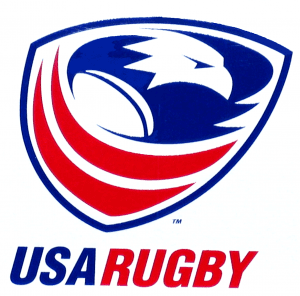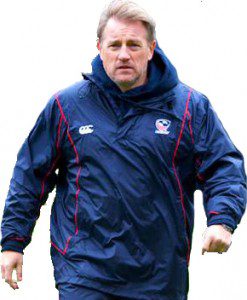 NEW YORK, NY: With the departure of Eddie O’Sullivan, USA Rugby is now accepting applications for Head Coach of the Eagles.
NEW YORK, NY: With the departure of Eddie O’Sullivan, USA Rugby is now accepting applications for Head Coach of the Eagles.
“We have opened up applications for the position and look forward to seeing who is interested – we can then consider who is most suited, create a short list and interview… Salary will depend on experience.
Coach is expected to live full time in the USA. [As for whom] I won’t see the applications until the deadline (next week).” – Nigel Melville [CEO & President of Rugby Operations for USA Rugby]
We’ve enlisted a first-rate and diverse group of knowledgeable Rugby Types to sort from a list of potential candidates that we compiled. They have to pick from the list and give their reasons. We reached out to numerous Rugby Experts for their opinion on this. Surprisingly, many felt it too hot a topic to weigh in on… Here are the candidates:

Dave Hodges: Eagles Forwards Coach, Denver Barbarians Head Coach Capped 54 times by Eagles
Paul Keeler: SF Golden Gate Head Coach, Former Old Blue Head Coach, Former Buffalo Rugby Head Coach
John Kirwin: Recent Head Coach of Japan. Former Head Coach of Italy. All Blacks Prolific Wing.
Marcello Loffreda: Former Argentina Head Coach, Former Leicester Tigers Head Coach. 44 Caps with Argentina
Nik Mallet: Recent Head Coach of Italy. Former Springbok Head Coach & Spring Bok.
Matt Sherman: Eagles Backline Coach, Stanford University Head Coach
Mike Tolkin: Eagles Defensive Coach, NYAC Head Coach, Xavier H.S. Head Coach
![]() ALEX GOFF, Editor-in-Chief of RUGBYMag.com and Rugby Magazine
ALEX GOFF, Editor-in-Chief of RUGBYMag.com and Rugby Magazine
The job of coaching the USA National Team to some level of success requires a coach to know what his player pool is, to formulate a concentrated group of players to dedicate themselves to playing for their country, and developing a game plan that uses their talents. The coach does not have to have a binder full of the newest (or even not-so-new) drills and plays from somewhere else. He certainly shouldn’t use test matches as tryouts. Instead, he should be knowledgeable about the game, should be able to handle a limited budget and assembly time, should be organized, and know who his players are. I think having someone like John Kirwan or Nick Mallet would just cost USA Rugby more money and change nothing. We’d spend all of 2012 watching test matches where the coach was just testing out players he’d never heard of before, and we’d spend another three years thinking World Cup, and only World Cup. There are some American-based coaches who should still be part of an elite coaching pathway, but they still need time in the USA system before we make them a head coach. For me, the choice comes down to Dave Hodges or Mike Tolkin. Hodges has more international experience and has experience as a 7s player, too. He is organized, pragmatic, and knows the players. Tolkin is an excellent communicator, and knows as much as any coach how players are developed (or not) from beginning to end.
I think each can work with the other – whether you make one Head Coach and the other Director of Player Development, or one Director of Coaching and the other something else doesn’t matter. Those two together would do the job.
BRUCE MCLANE: Rugby Analyst & Coach of NYAC & Xavier HS
In order to win at the International level you need 3 things: Culture, Selection & Tactics. Big-name foreign coaches struggle here because 1) They won’t have the network to properly develop a Culture 2) They don’t know the players and/or the coaches, so Selection can be a crap shoot 3) Tactics become problematic because Selection was compromised, which then creates a bad Culture. It’s a vicious cycle.
Culture comes from inside camp and obvious perspective. It also comes from being in constant communication with players outside of camp; seeing how they are, how they are progressing, getting updates from them, supporting them where they need support. Having a network of coaches throughout the nation to call on for honest feedback on players and assisting in the development of players when they are outside of camp, is a must. Mike Tolkin coached at the High School, U-19, and Senior Men’s level for many years. He has that network. He knows college coaches through his HS kids and via recruiting for the NYAC. He also has an International network developed through U-19s, players he’s coached and people he’s me, providing access to support and expertise inside and outside the USA.
Selection. It’s important to select players for what they can do – not for what you hope to get them to do. This is where knowing players is important. And knowing other coaches helps here because they can advise on a player’s strengths and weaknesses. This also makes the club coaches and the players feel important; that they matter and their opinion matters. This in turn helps Culture. Here again, I feel Tolkin is best.
Tactics. Putting players in a position where they do the things they are capable of doing often and setting your plan around that. Tolkin has a clear adaptable vision of the game and how he wants to play based on personnel and is best suited to get this right.
While I may be biased as I played and coached with him for 30 years, I still think Mike Tolkin is the best choice.
ED HAGERTY: Former Editor of Rugby Magazine from 1975-2009
Hire American! There are several Americans who could capably coach the Eagles for considerably less than the $250,000 that USA Rugby paid Eddie O’Sullivan. Three guys I’d consider are Jack Clark, Tom Billups and Mike Tolkin. Billups and Clark have enjoyed great success as players at the college, club, territorial all star and national levels. Following their playing careers, each served as coach of the US National Team. As a tandem, they have led the University of California to numerous National Collegiate Championships. Yet, they are not on this list and likely not applying for the position. Mike Tolkin was a first-class player and highly successful coach. He has led the NYAC to Super League titles and Xavier HS to several National High School Championships.
All three are intelligent, long-term, dedicated rugby men, raised in and familiar with the American rugby culture.
Assuming that an imported coach is the key to a winning Eagle team is fallacious. While American rugby is expanding and improving at a rapid rate (almost 3,000 clubs), it is patently clear that hiring another highly-paid, imported coach is NOT the key to success on the international stage. Improving America’s standard of international play will take years and a tremendous amount of grass roots development. It won’t happen until US rugby evolves and develops the resources to attract and train our fair share of America’s premier athletes. Improving American rugby is a long-term, evolutionary process. It certainly cannot be solved by throwing absurd amounts of money at imported coaches, unfamiliar with our sporting culture, who are not in it for the long haul.
![]() PATRICK CLIFTON: RUGBYMag.com & Rugby Magazine Writer/Contributor:
PATRICK CLIFTON: RUGBYMag.com & Rugby Magazine Writer/Contributor:
My pick is Mike Tolkin, though I’d be pleased with either him or Paul Keeler. I like them both because they are homegrown coaches who have extremely successful resumes in terms of coaching at the highest domestic level we have – the Super League. That means they’re extremely familiar with the pool of potential Eagles, and they have intimate knowledge of the current slate of Eagles. They both also have the ability to manage grown men playing an amateur sport for little or no money. For any foreign coach, that would be a learning process. I give Tolks a slight nod over Paul for two reasons: 1) He has more hands-on experience with younger age grades 2) He has worked side-by-side with Eagles 7s Coach Al Caravelli – under the NYAC banner – which any new Head Coach would need to do as the Eagles‘ head man. Further, the main reason I want a domestic coach is because he’d be cheaper and more sustainable. If the 7s teams are going to represent The Stars & Stripes in the Olympic Games as we hope, the college game is going to reach its full potential and the youth game is going to continue its rapid growth, the money needs to be spread more evenly. Not to mention, what if Eddie [O’Sullivan] had made the RWC semifinals? We’d sure want to keep him, but without a raise that’d be impossible. Pretty difficult to go up from $250,000, and much easier to do from $100,000.
Note: We reached out to numerous Rugby Experts for their opinion on this. Surprisingly, many felt it was too hot a topic for comment. Also, to see the Head Coach Application Specs and page, CLICK THIS.
Tomorrow, Eagles’ 7s Captain Matthew Hawkins interviews Eagle Nick Edwards live from Australia, where they will be playing in the opening matches of the HSBC 7s Tournament.

